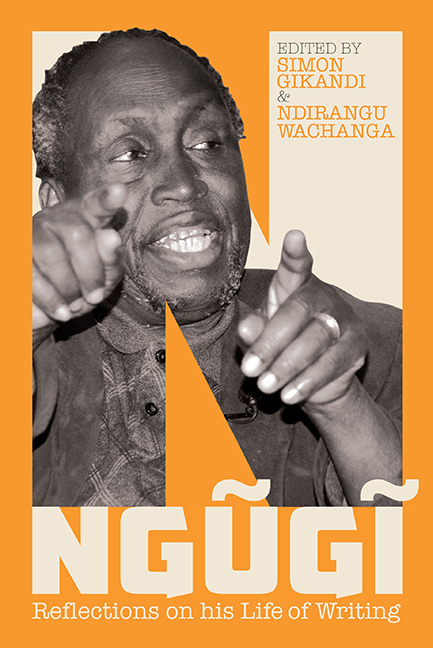Book contents
- Frontmatter
- Contents
- Preface
- Acknowledgements
- Chronology
- Photographic Section
- Introduction: Ngũgĩ wa Thiong'o: Reflections on His Life of Writing
- Ngũgĩ at Work
- Part I Serenades & Beginnings
- Part II Memories, Recollections & Tributes
- Part III Working with Ngũgĩ
- Part IV The Writer, the Critic & the World
- 23 Bricklayer & Architect of a World to Come
- 24 Revisioning Goethe's Idea of ‘World Literature’ [Commendation Address On the Awarding of the Dr. Phil. h.c. (Honorary Doctor of Letters) to Ngũgĩ wa Thiong'o, University of Bayreuth, Germany, April 2014]
- 25 Globalectics: Beyond Postcoloniality, & Engaging the Caribbean
- 26 Ngũgĩ & the Quest for a Linguistic Paradigm Shift: Some Reflections
- 27 Autobiographical Prototypes in Ngũgĩ wa Thiong'o's Early Fiction & Drama
- 28 Homecoming: The Idea of Return in the Works of Ngũgĩ wa Thiong'o
- 29 Gũcookia Rũĩ Mũkaro
- 30 Muthoni's Afterlives
- Part V The Other Ngũgĩ
- Appendixes
- References
- Bibliography of Ngũgĩ's Primary Works
- Works Cited
- Notes on Contributors
- Index
27 - Autobiographical Prototypes in Ngũgĩ wa Thiong'o's Early Fiction & Drama
from Part IV - The Writer, the Critic & the World
Published online by Cambridge University Press: 27 July 2019
- Frontmatter
- Contents
- Preface
- Acknowledgements
- Chronology
- Photographic Section
- Introduction: Ngũgĩ wa Thiong'o: Reflections on His Life of Writing
- Ngũgĩ at Work
- Part I Serenades & Beginnings
- Part II Memories, Recollections & Tributes
- Part III Working with Ngũgĩ
- Part IV The Writer, the Critic & the World
- 23 Bricklayer & Architect of a World to Come
- 24 Revisioning Goethe's Idea of ‘World Literature’ [Commendation Address On the Awarding of the Dr. Phil. h.c. (Honorary Doctor of Letters) to Ngũgĩ wa Thiong'o, University of Bayreuth, Germany, April 2014]
- 25 Globalectics: Beyond Postcoloniality, & Engaging the Caribbean
- 26 Ngũgĩ & the Quest for a Linguistic Paradigm Shift: Some Reflections
- 27 Autobiographical Prototypes in Ngũgĩ wa Thiong'o's Early Fiction & Drama
- 28 Homecoming: The Idea of Return in the Works of Ngũgĩ wa Thiong'o
- 29 Gũcookia Rũĩ Mũkaro
- 30 Muthoni's Afterlives
- Part V The Other Ngũgĩ
- Appendixes
- References
- Bibliography of Ngũgĩ's Primary Works
- Works Cited
- Notes on Contributors
- Index
Summary
Critics have speculated on the ‘autographical dimension’ in Ngũgĩ's fictional work for some time. The publication of Dreams in a Time of War, In the House of the Interpreter, and The Birth of a Dream Weaver, the memoirs covering his childhood and youth, enables us to engage in a productive meditation on the truism that all fiction is autobiographical, and the related question whether all autobiographical writing—including memoir, which covers a portion of an important person's life—is necessarily factual, as opposed to a retrospective construction. I do so by rereading the autobiographical moments in The River Between, Weep Not, Child, A Grain of Wheat, and Petals of Blood, from an arguably authoritative entry point availed by the memoirs. As Ngũgĩ tells us in Globalectics, ‘writing was an attempt to understand myself and history, to make sense of the apparently irrational forces of the colonial and postcolonial’ (17). In telling his own story, Ngũgĩ also tells the stories of his compatriots, particularly friends that he made at Alliance, who become prototypes for fictional characters. All three memoirs foreground characters we have already encountered in the early fiction and drama. The most noteworthy characters are Asinjo (This Time Tomorrow), Omange (The Black Hermit), Mzigo (Petals of Blood), Gatuiria (Devil on the Cross), and Carey Francis (River Between, Petals of Blood), and I focus on them in this paper. I also explore the disappearing autobiographical persona in the later fiction, and close with reflections on the author's latest turn to memoir, given his earlier reluctance because writing about his ‘ordinary’ life would be too boring (Detained 127). The memoirs point to the emergence of the exceptional writer worth celebrating.
The keen Ngũgĩ reader will easily recall variants of the author's story of an upbringing in a rural peasant household. We see variations of the indomitable biological mother Wanjiku (Nyokabi in Weep, Wangari in A Grain, Mariamu in Petals); the polygamous but insecure husband Thiong'o (Ngotho in Weep, Gĩkonyo's unnamed father in A Grain, Karega's unnamed father in Petals); and a supportive/model older brother Good Wallace (Kamau/Kori in Weep, Kihika in A Grain, Nding’ũri in Petals).
- Type
- Chapter
- Information
- NgugiReflections on his Life of Writing, pp. 156 - 162Publisher: Boydell & BrewerPrint publication year: 2018
- 1
- Cited by



